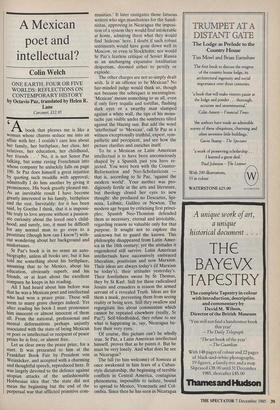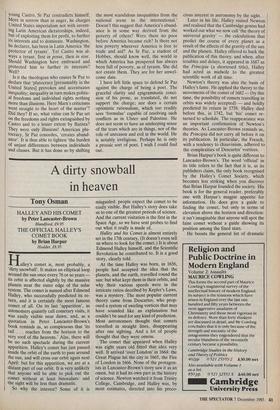A Mexican poet and intellectual?
Colin Welch
ONE EARTH, FOUR OR FIVE WORLDS: REFLECTIONS ON CONTEMPORARY HISTORY by Octavio Paz, translated by Helen R.
Lane
Carcanet, £12.95
Abook that pleases me is like a woman whose charms seduce me into an affair with her. I couldn't care less about her family, her birthplace, her class, her relatives, her education, her childhood, her friends . . .' No, it is not Senor Paz talking, but some raving Frenchman into whose company he unluckily falls on page 190. Sr Paz does himself a great injustice by quoting such twaddle with approval; admittedly I do him another by giving it prominence. His book greatly pleased me. As an inevitable result I have become greatly interested in his family, birthplace and the rest. Inevitably: for it has been said, by Goethe I think, that it is impossi- ble truly to love anyone without a passion- ate curiosity about the loved one's child- hood; and surely, too, it must be difficult for any normal man to go even to a prostitute (though how can I know?) with- out wondering about her background and misfortunes.
Sr Paz's book is in no sense an auto- biography, unless all books are; but it has told me something about his birthplace, assuming that to be Mexico, about his education, obviously superb, and his friends, or at least about the excellent Company he keeps in his reading.
All I had heard about him before was that he was a Mexican poet and intellectual who had won a peace prize. These will seem to many grave charges indeed. Yet after reading his book I must pronounce him innocent or almost innocent of them all. From the national, professional and mental deformations perhaps unjustly associated with the state of being Mexican or poet or intellectual or recipient of peace prizes he is free, or almost free.
Let us clear away the peace prize, for a start. It was presented to him at the Frankfurt Book Fair by President von Weizsacker, and accepted with a charming and thoughtful speech, reproduced here. It was largely devoted to the defence against utopian attacks of the unfashionable Hobbesian idea that 'the state did not mean the beginning but the end of the perpetual war that afflicted primitive com-
munities.' It later castigates those fatuous writers who sign manifestoes for the Sandi- nistas, approving in Nicaragua the imposi- tion of a system they would find intolerable at home, admiring there what they would find 'hideous' here. I doubt if such robust sentiments would have gone down well in Moscow, or even in Stockholm; nor would Sr Paz's fearless critique of Soviet Russia as an unchanging expansive totalitarian despotism, doomed either to petrify or explode.
The other charges are not so simply dealt with. Is it an offence to be Mexican? No fair-minded judge would think so, though not because the sobriquet is meaningless. 'Mexican' means something to us all, even if only fiery tequila and tortillas, flashing dark eyes or a swarthy man slumped against a white wall, the tips of his mous- tache just visible under the sombrero tilted against the blazing sun. But add the word 'intellectual' to 'Mexican', call Sr Paz as a witness exceptionally truthful, expert, sym- pathetic and percipient, and see how the picture clarifies and enriches itself.
To be a Mexican or Latin American intellectual is to have been unconsciously shaped by a Spanish past you have re- jected. You were born with the Counter- Reformation and Neo-Scholasticism that is, according to Sr Paz, 'against the modern world'. Your mother was pro- digiously fertile in the arts and literature, but theology closed her eyes to new thought: she produced no Descartes, Spi- noza, Leibniz, Galileo or Newton. The modern age began by criticising first princi- ples; Spanish Neo-Thomism defended them as necessary, eternal and inviolable, regarding reason as valuable only for that purpose. It sought not to explore the unknown but to guard the known. This philosophy disappeared from Latin Amer- ica in the 18th century; yet the attitudes it engendered still survive. Latin American intellectuals have successively embraced liberalism, positivism and now Marxism. Their ideas are always today's (if Marxism be today's), their attitudes yesterday's. Their forefathers swore by St Thomas, they by St Karl. Still for these radicalised Jesuits and crusaders is reason the armed servant of a revealed Truth. Ideas are for them a mask, preventing them from seeing reality or being seen. Still they swallow and regurgitate lies about communism which cannot be repeated elsewhere (really, Sr Paz?). Self-blindfolded, they refuse to see what is happening in, say, Nicaragua be- fore their very eyes.
Of course, this picture can't be wholly true. Sr Paz, a Latin American intellectual himself, proves that as he paints it. But he must be very lonely. And what does he see in Nicaragua?
The fall (to him welcome) of Somoza at once awakened in him fears of a Cuban- style dictatorship, the beginning of terrible conflicts in Central America, contagious phenomena, impossible to isolate, bound to spread to Mexico, Venezuela and Col- ombia. Since then he has seen in Nicaragua regimentation and militarisation, attacks on the one free newspaper, thought con- trol, internal espionage, leaders who speak and act in an increasingly dictatorial way, all signs of another revolution that will end in totalitarian petrification. He sees that Mexico's traditional policy of non- intervention is now 'inadequate'; she has principles and interests to defend. 'We want democratic and peaceful regimes in our continent. We want friends, not armed agents of an imperial power.' And what does Sr Paz wee in Cuba? Nothing to his taste: 'Cubans today are as poor or poorer than they were before, and far less free', a plight unforgettably illumin- ated by the flight a few years ago of more than 100,000 Cubans, not bourgeois parti- sans of the old regime nor political dissi- dents, but humble folk, starved and de- sperate, proletarian victims of a dicta- torship of the proletariat. Unforgettably? Mr Kinnock, for one, has quite forgotten it, or was perhaps never aware of it. Sr Paz is over-inclined to suppose that, when God rained down wisdom and insight on the world, only Latin-American intellectuals put up their umbrellas.
If Castro is a totalitarian dictator of a sort entirely new to Latin America, which has know so many dictators, and totally subservient to and dependent on Moscow, Sr Paz is to my mind over-inclined to blame Washington for all that. A virulent anti- Americanism is epidemic among Latin American intellectuals. Sr Paz notes with distaste many examples, including the 'li- beration theologians' for whom American imperialism is 'the prefiguration of the Anti-Christ'. From this deformation too Sr Paz is in general quite free. His picture of the United States is understanding, thoughtful, loving, even envious in a quite innocent way. In particular he denounces as itself 'monstrous' any attempt to equate the United States and the Soviet Union as twin monsters. Yet incongruous carpings at America do stain his pages, as if inserted by some 'liberation theologian', though an unusually polite and intelligible one. Was it perhaps this theologian who speaks ritually of the 'victims of European imperialism', in a world in which, for instance, the average income of the people of Zaire has declined ten-fold since the Belgians left?
Sr Paz chides Washington for its 'insensi- tivity and obtuseness' during the first phase of the Cuban revolution, 'before it was taken over by the communist bureaucracy': now when was that? 'Washington's dis- dainful and hostile policy', he continues, 'threw Castro into Russia's arms.' Is this not historically untrue? Was not Castro always in Russia's, arms? If so, Sr Paz sees clearly now in Nicaragua what he failed to see in Cuba, and still fails to see: 'a regime transforming itself day by day . . . into a communist dictatorship.' Why? Perhaps because he is now a sadder and wiser man, yet cannot yet bring himself to part with every cherished illusion.
Moreover, by chiding Washington for not having been more forthcoming with the young Castro, Sr Paz contradicts himself. More in sorrow than in anger, he charges United States imperialism not with invent- ing Latin American dictatorships, indeed, but of exploiting them for profit, to further its interests and to dominate. Washington, he declares, has been in Latin America 'the protector of tyrants'. Yet Castro was al- ways a tyrant, first in posse, then in esse. Should Washington have embraced and protected him to further its interests? Well?
Is it the theologian who causes Sr Paz to declare that 'plutocracy [presumably in the United States] provokes and accentuates inequality; inequality in turn makes politic- al freedoms and individual rights nothing more than illusions. Here Marx's criticisms went straight to the heart of the matter'? Did they? If so, what value can Sr Paz set on the freedoms and rights extinguished by Castro and to a lesser extent by Batista? They were only illusions! American plu- tocracy, Sr Paz concedes, 'creates abund- ance'. It is thus able to lighten 'the burden of unjust differences between individuals and classes. But it has done so by shifting the most scandalous inequalities from the national scene to the international.' Doesn't this suggest that America's abund- ance is in some way derived from the poverty of others? Were there no poor before America became rich? Is there not less poverty wherever America is free to trade and aid? As Sr Paz, a student of Hobbes, should know well, the world in which America has prospered has always been full of poverty, as of tyrants. She did not create them. They are for her unwel- come data.
I have left little space to defend Sr Paz against the charge of being a poet. The graceful clarity and epigrammatic conci- sion of his prose, as translated, do not support the charge; nor does a certain optimistic rationalism, which too readily sees 'formulae' capable of resolving such conflicts as in Ulster and Palestine. He does not seem to have an unsleeping sense of the tears which are in things, nor of the role of unreason and evil in the world. He is notably irreligious. Perhaps he is only a prosaic sort of poet. I wish I could find out.




































































 Previous page
Previous page